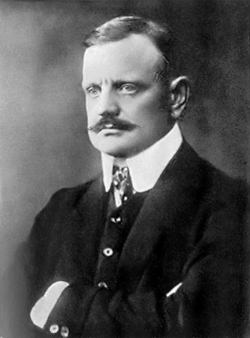
- 7 clarence grove
- horsforth
- leeds, LS18 4LA
- UK
- tel: 0113 258 1300
- order online
- www.editiondb.com
- info@editiondb.com
Sibelius, Jean (1865-1957)
Jean Sibelius was a Finnish composer of the late Romantic period. His music played an important role in the formation of the Finnish national identity.
The core of Sibelius' oeuvre is his set of seven symphonies. Like Beethoven, Sibelius used each successive work to further develop his own personal compositional style. His works continue to be performed frequently in the concert hall and are often recorded.
In addition to the symphonies, Sibelius' best-known compositions include Finlandia, the Karelia Suite, Valse triste, the Violin Concerto in D minor, Kullervo, and The Swan of Tuonela.
Sibelius composed prolifically until the mid-1920s. However, after completing his Seventh Symphony (1924), the incidental music to The Tempest (1926), and the tone poem Tapiola (1926), he produced no large scale works for the remaining thirty years of his life. Although he is reputed to have stopped composing, he in fact attempted to continue writing, including abortive efforts to compose an eighth symphony. He wrote some Masonic music and re-edited some earlier works during this last period of his life, and retained an active interest in new developments in music, although he did not always view modern music favorably.
The Finnish 100 mark note featured his image until it was taken out of circulation in 2002 when the euro was adopted as a cash currency. Flag Day on 8 December, the composer's birthday, is also known as the 'Day of Finnish Music'.

Compositions in catalogue |
Catalogue no. |
Price £ |
To buy click PayPal links below |
Composer/arranger |
||
| Brentwood Horn Club series | ||||||
| Sixteen horns | ||||||
| Finlandia Op.26 (16 horns + timps & perc) | edb 0216001 |
33.00 |
Sibelius / Foley | |||